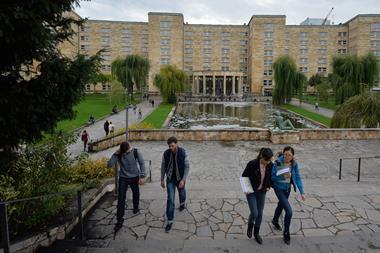Hungarian students look set to miss out on Erasmus+ scholarships this year, as negotiations between their government and the European Commission remain stalled. The commission says Hungary has failed to deliver the reforms necessary and it is too late for funding to be approved this coming winter, despite multiple meetings since February between the two sides.
The situation facing Hungarian academics has deteriorated as the country’s government find itself increasingly at odds with the EU. In January, the commission froze grants from Horizon Europe and Erasmus+ student exchange for 21 universities in Hungary. Billions of euros in funding had already been suspended over breaches of fundamental EU values.
Orbán has essentially engineered the top down dismantlement of liberal democracy
Laurent Pech, University College Dublin
There are no meetings planned between the commission and Hungarian officials for the remainder of August. Hungarian government officials have claimed that Erasmus+ scholarships are not in danger, however.
This summer, the European parliament approved a resolution questioning Hungary’s ability to take over the EU presidency in 2024, signalling hardening opposition to Victor Orbán and his transformation of Hungary since coming to power in 2010. This was marked by a European parliament report concluding in 2022 that Hungary can no longer be considered a liberal democracy.
Orbán’s government is also mired in accusations of misuse of EU funds, with investigations reportedly ongoing. In a 2023 survey, 77% of companies in Hungary consider that corruption is a problem, while 88% of respondents considered it widespread in the country.
When questioned, academic commentators reel off grievances against the government and its erosion of academic freedom. ‘Orbán has essentially engineered the top down dismantlement of liberal democracy,’ says Laurent Pech, a professor of law at University College Dublin, Ireland. ‘One of the aspects of his consolidation of electoral autocracy has been the systemic violation of academic freedom.’
According to the Academic Freedom Index, Hungary languished in the bottom 20–30% of 179 countries ranked in 2022.
Public foundations
The commission started blocking the transfer of funds to some universities under Horizon Europe in December 2022. It cited the Hungarian government’s transfer of state universities to the control of public foundations. The commission had previously criticised the legal uncertainty of an arrangement that outsourced universities to public trusts, and noted political conflicts of interest in appointments to these trusts.
Researchers can still apply to Horizon Europe, but funding is suspended until the commission is satisfied that the situation is resolved.
Every change that undermines democracy is passed as a law or a decree by parliament
Dóra Piroska, Central European University
‘It is a kind of privatisation of public resources through this trust, which the government completely control through the appointment of friends of the ruling party,’ says Pech. This can give them control of the purse strings and EU funding, he adds.
‘The people who are sitting in these foundations are largely political appointees,’ adds Kati Cseres, professor of law at the University of Amsterdam. ‘These foundations are not accountable to anyone.’ Hungarian ministers reportedly were aghast at the commission’s move, and one minister suggested that the situation be quickly resolved.
The government complained about unfair treatment and threatened in January to take the case to the Court of Justice of the European Union (CJEU). In February, the government announced that seven ministers would step down from board positions on the foundations. This was not viewed as adequate. In May it was reported that six Hungarian universities had lodged annulment actions at the CJEU.
Some critics of the Hungarian government have been baffled by its recalcitrance, given its existing control over academia. ‘This is an attempt to capture the universities through a new arrangement,’ says Pech. ‘If they lost the election they would still control the universities and the opposition would not be able to restore academic freedom.’
Academic dependence
Academic independence was being curtailed long before the ruling Fidesz party decided to privatise universities. In April 2017, the government rushed through a new law to specifically target the Central European University (CEU) in Budapest. This was founded in 1991 by the Hungarian–American philanthropist and financier George Soros to promote the values of an open society.
The CEU has since mostly left Budapest and moved to Vienna, amid a torrent of official criticism of Soros, which many view as laced with anti-Semitism.
We may have reached the point of no return for Hungary. This includes academic freedom
Laurent Pech, University College Dublin
Then, in 2018, the Orban government moved against the Hungarian Academy of Sciences, taking financial control away from this prestigious institution. ‘Every change that undermines democracy is passed as a law or a decree by parliament, where government has two-thirds majority,’ says Dóra Piroska, professor of international relations at the CEU in Vienna. The government, she explains, argues that institutions should not be conducting independent research when they are funded by taxpayers – the government should have direct control of research funding on behalf of the electorate. ‘It’s invoking democratic principles to undermine academic freedom,’ says Piroska. In 2020, the Council of Europe passed a resolution that included an appeal to the Hungarian government to reverse legislation or practices that limited academic freedom.
In March 2023, a European parliament report on academic freedom in the EU zeroed in on Hungary as the one EU member state where ‘structural de facto violations of academic freedom are taking place’. It noted that academic freedom has deteriorated since 2011.
Starved of funds
There is ongoing debate within Hungarian universities around whether they should join the new foundations to receive more funding.
Commentators say lack of funding has left academia vulnerable. ‘There were massive cuts to the budget of many universities since 2010, until 2020, when these changes began to be enacted,’ says Piroska. Academic salaries declined until ‘an assistant professor was earning less than a cashier [in a supermarket]’, she adds, forcing them to take multiple jobs.
Cseres says academics have become less vocal. Many researchers decided to leave the country, and she has heard about academics being fired for political reasons. Cseres adds that there is self-censorship in academia, and those who don’t approve of the system choose their fights carefully, ‘because that might affect their job security’. In the most recent statistics from the European Research Council, no researcher in Hungary won any of its 218 prestigious grants for 2022.
For a long time, the commission stood by as the changes were introduced. The Fidesz party was part of the major centre-right grouping in the European parliament, the European People’s Party (EPP), until 2021. This had seen Fidesz allied to – amongst others – Angela Merkel’s CDU party, something some commentators say shielded Orbán for a time within the EU.
Point of no return?
Gradually, say critics, the Orbán government changed the constitution and laws, and snuffed out independent entities that could pose a challenge to its control. There is very little independent media left in the country, where opposition from scientists and academics to changes to universities could be aired. Reporters Without Borders rated the country 72nd out of 180 in its 2023 index, noting that Orbán has built a media empire ‘whose outlets follow his party’s orders’.
The Fidesz party won the last general election handily in 2022. However, opposition to military support for Ukraine in its effort to expel Russia have alienated traditional EU allies, such as Poland.
Hungary’s universities are now governed by people who approve of government policies, commentators note. Others view scientists’ fears of being targeted by officials as justified. ‘Hungary is the only EU member state where I detected a sense of fear from people targeted by the regime,’ Pech says. ‘There is very little resistance. Most critics have given up or left the country.’
In its 2023 Rule of Law Report for Hungary, the European commission noted justice-related and anti-corruption reforms, though no improvements in public service media or in removing obstacles for civil society groups.
It is now unclear whether the conflict between the EU and Hungary can be resolved this year. There is a belief that the commission’s attitude has hardened and any cosmetic changes suggested by the Orbán government will not be enough. Also, while some progress has been made on judicial reforms, there have been no signs of hope for researchers cut adrift from EU funding. ‘We may have reached the point of no return for Hungary,’ says Pech. ‘This includes academic freedom.’

















1 Reader's comment